Key takeaways
- Health insurance companies in Germany cover basic dental care and part of the dental treatment costs.
- Dental treatments like inlay, root canals, implants, etc., are quite expensive in Germany. For example, an inlay costs around 720 €, and an implant can cost approx. 4500 €.
- Good supplementary dental insurance covers 80 to 100% of the treatment cost.
- Supplemental dental insurance providers in Germany apply reimbursement limits in the first 4 to 5 years of signing the contract.
- As per studies, 90% of adults have dental issues.
This is how you do it
- Identify if you need dental insurance based on your age, health habits, dental treatment costs, and insurance costs.
- You should not wait to get dental insurance until dental problems start, as dental insurance won’t cover existing dental issues.
- If you decide to take dental insurance in Germany, we find Concordia (Zahn Sorglos), Deutsche Familienversicherung AG* (Exclusiv 100), Barmenia* (Mehr Zahn 100 + Mehr Zahnvorsorge Bonus), and Feather* (Advanced) to be among the best dental insurance providers in Germany as of Aug 2024.
- We have removed Ottonova* from our list due to its falling customer rating. You can read the reviews on Trustpilot.
Table of Contents
Studies show that 90% of adults suffer from some kind of dental problem. Depending on the issue, dental treatment costs can quickly go from 100€ to a few thousand.
Moreover, your health insurance company doesn’t cover the entire cost of dental treatment. Hence, getting additional dental insurance makes sense in most cases.
Best Dental Insurance Plans in Germany – Quick Overview
In our research, we found
- Deutsche Familienversicherung AG* (Exclusiv 100),
- Barmenia* (Mehr Zahn 100 + Mehr Zahnvorsorge Bonus),
- and Feather* (Advanced)
among the best dental insurance plans in Germany as of 2024. You can read how we found the best dental insurance plans here.
NOTE: Feather is an insurance agent and sells Barmenia’s dental insurance policies. The benefit of taking insurance from Feather is that you can file claims and get customer support in English.
Deutsche Familienversicherung Dental Insurance
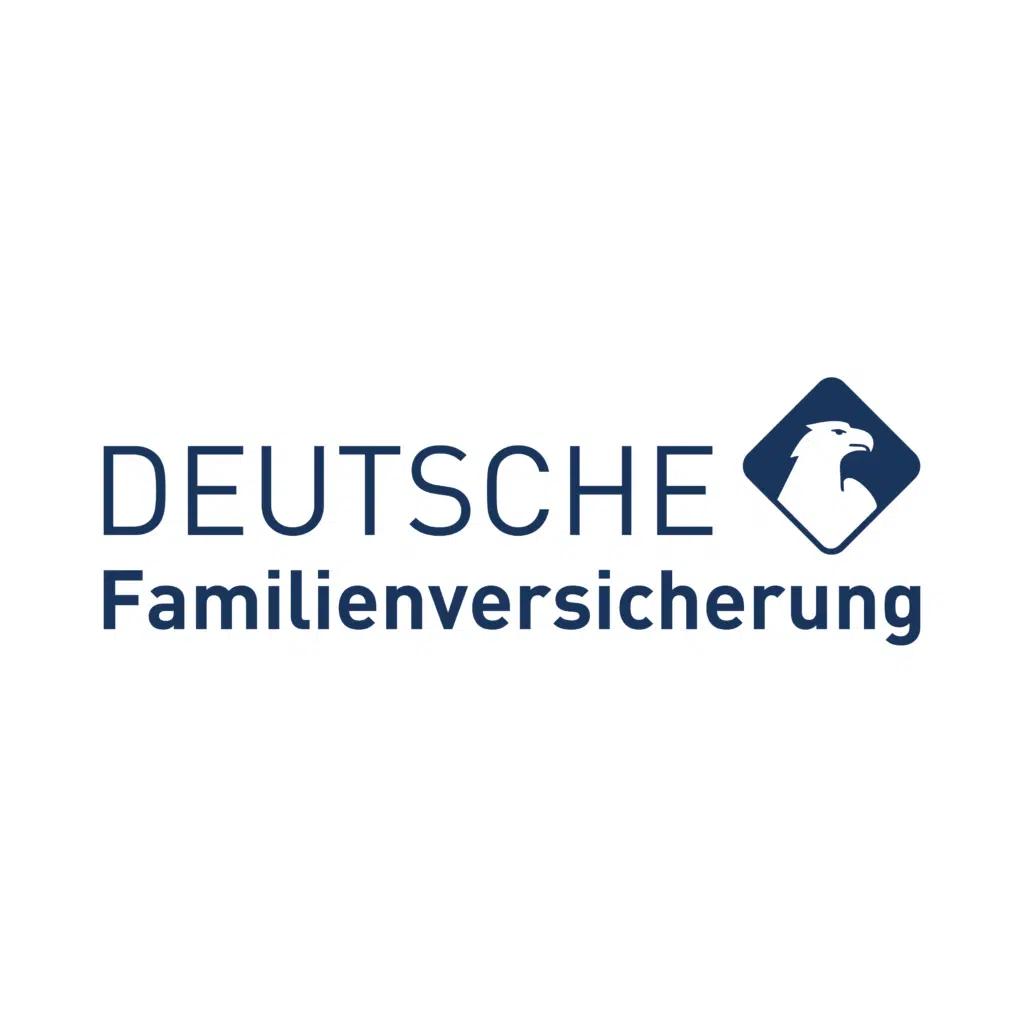
- Cheaper than Barmenia and Feather.
- Up to 100% reimbursement for dentures, orthodontics, and professional cleaning (up to €200)
- Reimbursements are limited to the maximum GOZ and GÖA factor.
- No waiting period
Get Barmenia Dental Insurance via Feather
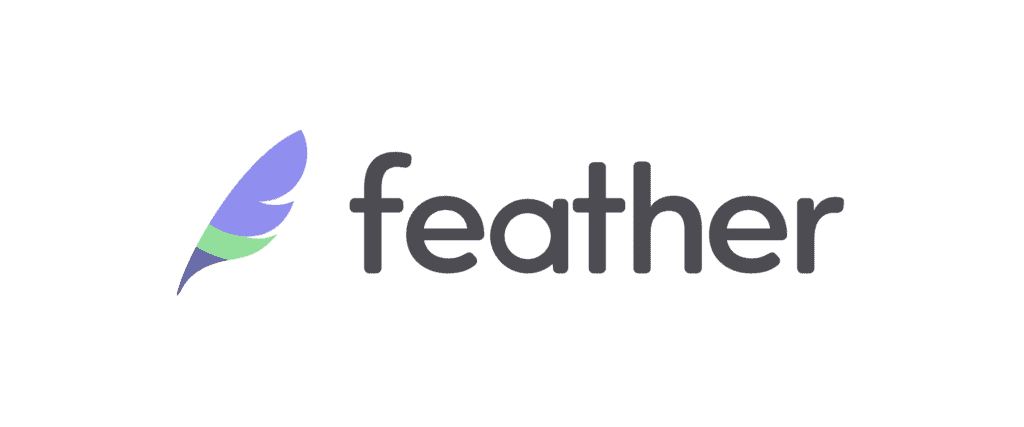
- Feather is an insurance agent that sells Barmenia’s dental insurance plans.
- Feather offers services in English.
- Feather is rated 4.9 out of 5 by around one thousand customers on Trustpilot.
Barmenia Dental Insurance

- No limit on professional cleaning and dental treatments (root canal, fillings, etc.)
- Reimbursements are limited to the maximum GOZ and GÖA factor.
- No waiting period
Table comparing tariffs from different dental insurance providers in Germany
Dental insurance companies divide dental coverage into three parts.
- Dental treatment (Zahnbehandlung): Fillings, Root canals, Periodontal diseases, etc.
- Dentures (Zahnersatz): Implants, Inlays, Crowns, Bridges, etc.
- Orthodontics (Kieferorthopädie)
The insurers put different reimbursement limits on each category.
For example, with Barmenia, you can claim 100% of the costs for treatments under the “dental treatment” category (Zahnbehandlung) from day one.
On the other hand, Barmenia limits the maximum amount it’ll reimburse in the first four years for treatments under the “dentures” category (Zahnersatz).
| Services | Deutsche Familienversicherung AG* (DFV) (Exklusiv) | 🟢 Barmenia* / Feather* (Mehr Zahn 100 + Zahnvorsorge Bonus) / (Advanced) |
|---|---|---|
| Main differences | 🟢 Cheaper than Barmenia / Feather. 🟠 The reimbursement limit applies to all treatments for the first four years. However, the limits are high enough to cover the treatment costs under the “Zahnbehandlung” category. | 🟠 Expensive than other options. 🟢 No reimbursement limit on treatments under the “Zahnbehandlung” category. |
| Cost of insurance for a healthy person | 🟢 0-20 Jahre 20,00 € 21-30 Jahre 26,50 € 31-40 Jahre 34,50 € 41-45 Jahre 41,00 € 46-50 Jahre 45,50 € 51-55 Jahre 54,00 € 56-60 Jahre 59,00 € 61-70 Jahre 64,50 € 71-80 Jahre 63,50 € ab 81 Jahre 37,00 € | 0-20 Jahre 16,30 € 21-30 Jahre 21,25 € 31-40 Jahre 34,25 € 41-50 Jahre 45,45 € 51-60 Jahre 62,15 € ab 61 Jahre 73,15 € |
| Trust Pilot rating (as of Apr 2024) | 🟢 4.2 (4292 people rated) | 3.2 (2390 people rated) |
| DENTAL TREATMENT (ZAHNBEHANDLUNG) | ||
| Professional teeth cleaning | up to 200 € per year | 🟢 No limit |
| Periodontal treatment | 100%* (Reimbursement limit period applies) | 🟢 100%* (No reimbursement limit period) |
| Plastic fillings | 100%* (Reimbursement limit period applies) | 🟢 100%* (No reimbursement limit period) |
| Root canal | 100%* (Reimbursement limit period applies) | 🟢 100%* (No reimbursement limit period) |
| DENTURES (ZAHNERSATZ) (Reimbursement limit period applies) | ||
| Inlays | 100%* | 100%* |
| Implants | 100%* | 100%* |
| Crowns | 100%* | 100%* |
| Veneers | Medically necessary | Medically necessary |
| ORTHODONTIC (KIEFERORTHOPÄDIE) (Reimbursement limit period applies) | ||
| Orthodontics | 100% reimbursement (max. 2000€) for medically necessary treatment for adults | 100% reimbursement (max. 2000€) for medically necessary treatment for adults |
| OTHER SERVICES | ||
| Bleaching | 200€ every 3 years | 🟢 200€ every 2 years |
| Anesthesia | 100% | 100% |
| REIMBURSEMENT LIMITS AND PERIODS | ||
| Period of reimbursement limits | 48 months (Insurance year) | 🟢 48 months (Calendar year) |
| Reimbursement limit in the first 4 years | 1st year: 1250 € 2nd year: 2500 € 3rd year: 3750 € 4th year: 5000 € | 🟢 1st year: 1500 € 2nd year: 3000 € 3rd year: 4500 € 4th year: 6000 € |
| Waiting period | No | No |
| The reimbursement amount is limited to the maximum GOZ and GÖA factor | Yes | Yes |
| Reimbursement of treatments not covered in public health insurance | Deduct 30% of the costs and reimburse the rest | 🟢 Deduct 20% of the costs and reimburse the rest |
| GOZ guarantee or innovation guarantee | Yes | Yes |
| Minimum contract term | 🟢 You can cancel the insurance contract anytime. Exception: If you file a claim within 24 months of the start of the contract, you cannot cancel the contract for 12 months. | 12 months |
- *100% reimbursement doesn’t mean the insurance company will pay any invoice created by the dentist. Insurance companies reimburse up to the maximum GOÄ and GOZ rates.
- -Feather is an insurance agent and sells Barmenia’s dental insurance plans.
💡 TIP: You should get a cost estimate from your dentist before starting the treatment that cost above 500€. Submit it to your dental insurance provider to check what costs they cover.

Dental insurance costs in the long-term vs. short-term
Many people buy dental insurance plans, considering which one offers the best services and is cheap today. However, they overlook the price they’ll pay over the years.
There are many insurance policies that might be cheaper at the time you take them. However, they cost more over the years than other plans.
Here is an example of how much you can save with Deutsche Familien Versicherung over 35 years.
| Age | DFV | Barmenia | DFV | Barmenia | Barmenia – DFV |
|---|---|---|---|---|---|
| Monthly premium in euros | Yearly premium in euros | ||||
| 35 | 34.5 | 34.25 | 414 | 411 | -3 |
| 36 | 34.5 | 34.25 | 414 | 411 | -3 |
| 37 | 34.5 | 34.25 | 414 | 411 | -3 |
| 38 | 34.5 | 34.25 | 414 | 411 | -3 |
| 39 | 34.5 | 34.25 | 414 | 411 | -3 |
| 40 | 34.5 | 34.25 | 414 | 411 | -3 |
| 41 | 41 | 45.45 | 492 | 545.4 | 53.4 |
| 42 | 41 | 45.45 | 492 | 545.4 | 53.4 |
| 43 | 41 | 45.45 | 492 | 545.4 | 53.4 |
| 44 | 41 | 45.45 | 492 | 545.4 | 53.4 |
| 45 | 41 | 45.45 | 492 | 545.4 | 53.4 |
| 46 | 45.5 | 45.45 | 546 | 545.4 | -0.6 |
| 47 | 45.5 | 45.45 | 546 | 545.4 | -0.6 |
| 48 | 45.5 | 45.45 | 546 | 545.4 | -0.6 |
| 49 | 45.5 | 45.45 | 546 | 545.4 | -0.6 |
| 50 | 45.5 | 45.45 | 546 | 545.4 | -0.6 |
| 51 | 54 | 62.15 | 648 | 745.8 | 97.8 |
| 52 | 54 | 62.15 | 648 | 745.8 | 97.8 |
| 53 | 54 | 62.15 | 648 | 745.8 | 97.8 |
| 54 | 54 | 62.15 | 648 | 745.8 | 97.8 |
| 55 | 54 | 62.15 | 648 | 745.8 | 97.8 |
| 56 | 59 | 62.15 | 708 | 745.8 | 37.8 |
| 57 | 59 | 62.15 | 708 | 745.8 | 37.8 |
| 58 | 59 | 62.15 | 708 | 745.8 | 37.8 |
| 59 | 59 | 62.15 | 708 | 745.8 | 37.8 |
| 60 | 59 | 62.15 | 708 | 745.8 | 37.8 |
| 61 | 64.5 | 73.15 | 774 | 877.8 | 103.8 |
| 62 | 64.5 | 73.15 | 774 | 877.8 | 103.8 |
| 63 | 64.5 | 73.15 | 774 | 877.8 | 103.8 |
| 64 | 64.5 | 73.15 | 774 | 877.8 | 103.8 |
| 65 | 64.5 | 73.15 | 774 | 877.8 | 103.8 |
| 66 | 64.5 | 73.15 | 774 | 877.8 | 103.8 |
| 67 | 64.5 | 73.15 | 774 | 877.8 | 103.8 |
| 68 | 64.5 | 73.15 | 774 | 877.8 | 103.8 |
| 69 | 64.5 | 73.15 | 774 | 877.8 | 103.8 |
| 70 | 64.5 | 73.15 | 774 | 877.8 | 103.8 |
| Total saving | 1962€ | ||||
We assume you took the insurance at 35 and had no dental problems when you took the insurance.
As you can see, if you took DFV* (Exklusiv 100) over Barmenia* (Mehr Zahn 100 + Mehr Zahnvorsorge Bonus) when you were 35 and stayed with it till you were 70, you would have saved 1962€. Even if you stayed with DFV for ten years, you would have saved around 260€ in premiums.
So, when deciding on dental insurance, always consider the premiums you’ll pay over time, not which is cheaper today.
Things to be aware of before taking dental insurance in Germany
Calendar year vs. insurance year
To calculate the reimbursement limit periods, insurers use either calendar or insurance year. The difference between the two is that the insurance year starts when you conclude the contract. However, the calendar year starts in January.
This means if you took a policy in Dec 2023, in Jan 2024, your first calendar year is finished. On the other hand, if you took a policy in Dec 2023, your first insurance year will end on Dec 2024.
So, an insurance plan with a calendar year is better than an insurance year.
Reimbursement for dental treatments not covered by public health insurance.
Dental insurance companies reimburse part of the costs of dental treatments not covered by public health insurance. You should ensure that your dental insurance provider reimburses at least 70% of the costs.
The dental plans we found best cover 80% (Barmenia) and 70% (DFV) of the dental costs for treatments not covered by public health insurance.
Existing dental problems or recommended treatments
No dental insurance provider covers the existing dental problems or already recommended dental treatments. We recommend getting advice from an insurance broker if you have existing problems.
GOZ guarantee or Innovation guarantee
The medical industry is advancing continuously. So, there will be treatments that are not known today. GOZ guarantee ensures that treatments available in the future are also insured.
Anesthesia coverage
Dentists use different types of Anesthesia based on your treatment. Not all types of anesthesia procedures are covered by public health insurance.
It’s vital that your dental insurer doesn’t apply any reimbursement limit on the anesthesia procedure.
Minimum contract term
Some dental insurance plans have 24 months of minimum contract term. This means you cannot cancel the contract within 24 months.
The dental plans we found best have a 12-month minimum contract term.
Reimbursement limits
Dental insurance providers apply reimbursement limits in the first four years of the contract. Ensure these limits are high enough.
Things we found out based on customers’ reviews.
- More than 90% of the rejected claims belong to customers with existing dental problems.
- If possible, don’t change your dentist often. Doing so will make it difficult for you to provide a dental history to your insurer. Insurance companies need your dental history to process claims above 500 €.
- Dental insurance companies reimburse small bills like professional cleaning within a day or two. However, they need around 3 to 8 weeks to reject or accept a big claim (more than 500€).
- Customers often complain that they didn’t get the whole invoice reimbursed even if the insurer’s website advertises 100% coverage. However, insurance providers reimburse the amount up to the maximum GOÄ and GOZ rates. You’ll learn more about it next.
Does dental insurance reimburse 100% of dental costs?
No, there is no dental insurance plan on the market that covers unlimited dental costs.
100% reimbursement doesn’t mean unlimited cost reimbursement. Many customers get confused by the term 100% reimbursement and miss the limits set by dental insurance companies.
Example 1
Suppose your dental insurer reimburses 100% of the costs and has a reimbursement limit of 1000€.
Case 1: Invoice of 900€
In this case, 100% of the invoice amount (900€) is lower than the reimbursement limit. So, the insurer will reimburse the complete cost, i.e., 900€.
Case 2: Invoice of 1200€
In this case, 100% of the invoice amount (1200€) exceeds the reimbursement limit. So, the insurer will reimburse up to the maximum limit, i.e., 1000€.
Example 2
Suppose your dental insurer reimburses 80% of the costs and has a reimbursement limit of 1000€.
Case 1: Invoice of 900€
In this case, 80% of the invoice amount (720€) is lower than the reimbursement limit. So, the insurer will reimburse the complete cost, i.e., 720€.
Case 2: Invoice of 1500€
In this case, 80% of the invoice amount (1200€) exceeds the reimbursement limit. So, the insurer will reimburse up to the maximum limit, i.e., 1000€.
What reimbursement limits do dental insurance companies apply?
There are two types of reimbursement limits when it comes to dental insurance.
- GOZ and GOÄ maximum rate limit
- The reimbursement limit during the first four years of the contract
GOZ and GOÄ maximum rate limit
GOZ (Gebührenordnung für Zahnärzte) is the fee schedule for dentists in Germany. It regulates the costs of dental services charged by dentists.
Here is how the dental costs are calculated per the GOZ fee schedule.
Dental cost = Score x Point Value (5.62421 cents) x Factor (1 to 3.5) x Nr of teeth
Where,
- Score is a number assigned to each dental service listed in the GOZ fee schedule. For example, the score assigned to “Professional dental cleaning” is 28.
- Point value is 5.62421 cents [1] as of 2024.
- Factor varies from 1 to 3.5. The dentist determines the factor based on the difficulty of the treatment.
So, professional dental cleaning costs vary between 47.24 € (28 * 5.624 * 1 * 30) and 165.34 € (28 * 5.624 * 3.5 * 30).
Dental costs can vary greatly depending on which factor the dentist uses to calculate them. Dental insurance companies limit the reimbursement to the maximum GOZ factor.
So, if your dentist uses a factor higher than the maximum GOZ factor to calculate the dental costs, you pay the excess.
What is the maximum GOZ factor in Germany?
Dental services are divided into three categories and each category has a separate maximum GOZ factor.
- Personal services: Up to 3.5 factor
- Laboratory service: Up to 1.3 factor
- Medical/Technical services: Up to 2.5 factor
Reimbursement limit during the first four years
Every dental insurance company applies a reimbursement limit in the first four years of the start of the contract. The insurer reimburses up to the maximum limit set in the contract during these years.
From the fifth year, there are no reimbursement limits.
What is the Approximate Cost of Dental Treatments in Germany?
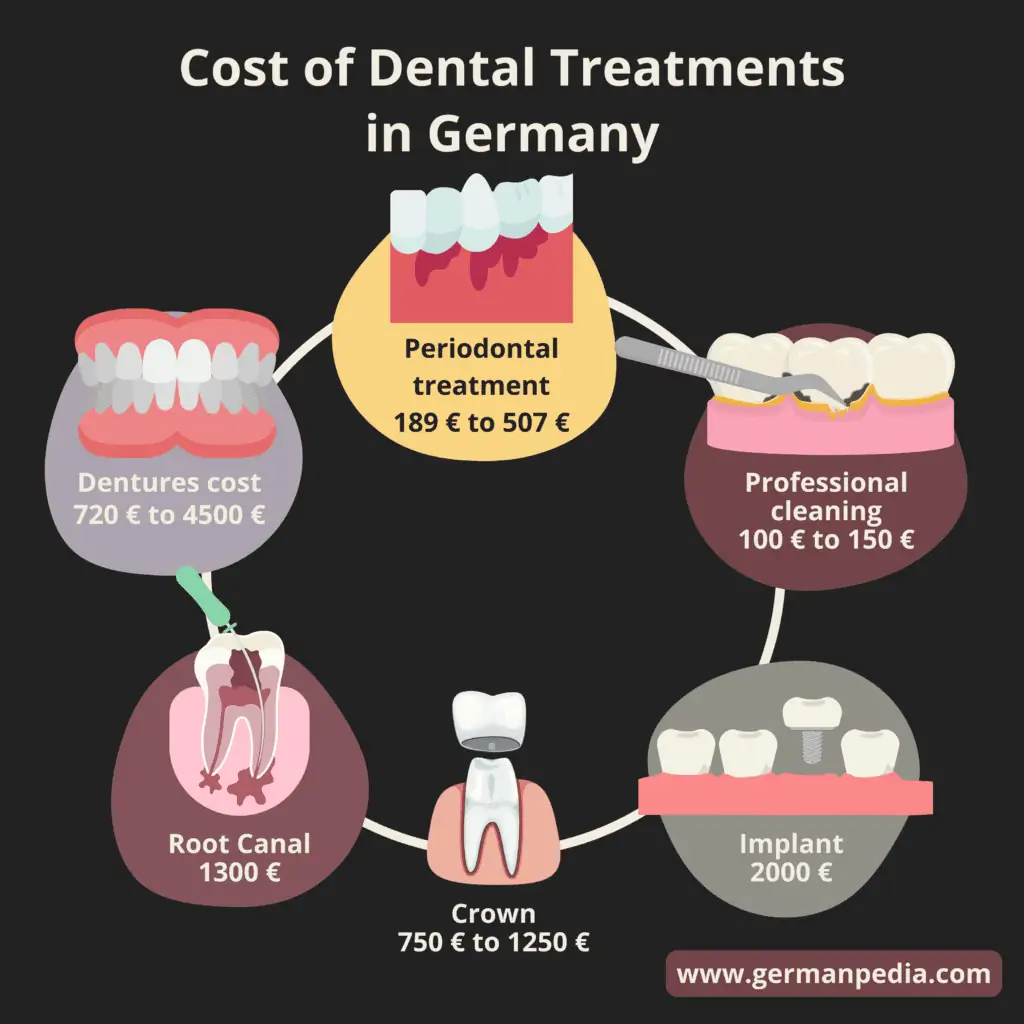
| Dental Treatment | Cost |
|---|---|
| Professional cleaning | 80 € and 120 € per professional cleaning. Public health insurance companies like TK cover 40 € per annum for professional cleaning. |
| Tooth extraction | Public health insurance covers the complete cost of tooth extraction. However, you pay around 200 € to 300 € for treatments under general anesthesia and 100 € to 200 € for treatments under nitrous oxide. |
| Tooth filling | Public health insurance covers amalgam and plastic tooth filling, but you pay for the ceramic tooth filling. Ceramic tooth filling costs around 550 € per tooth. |
| Root canal | Root canal treatment costs between 200 € and 1000 € per tooth. The public insurer covers the cost only if the tooth can be saved. However, you must still pay part of the costs out of your own pocket. |
| Dental implant | Public health insurance doesn’t cover the costs of dental implants. A dental implant costs between 1400 € and 2200 € per tooth. |
| Periodontitis | The treatment cost varies depending on the treatment method and the extent of damage. You can expect to pay between 100€ and 500€. Public health insurance covers the cost of basic treatments only. Modern treatment methods like Laser or Vector therapy are not covered. |
| Bleaching | Home bleaching costs around 200€ to 500€. In-office bleaching costs around 30€ to 70 euros per tooth. A power bleach with a lamp is around 600€ to 800 euros. Public health insurance doesn’t cover the costs, as bleaching is purely cosmetic treatment. |
As dentures are the most expensive of all dental treatments in Germany, let’s look deeper into their costs.
| Denture treatment | Average Cost |
|---|---|
| Ceramic crown | 750 € to 950 € per tooth |
| Gold crown | 900 € to 1250 € per tooth |
| Any telescopic crown | 500 € to 850 € |
| Three-unit bridge restoration with ceramic | 600 € to 1400 € |
| Three-unit bridge restoration with gold | 2300 € to 2700 € |
| Three-unit bridge restoration with zirconia | 2600 € to 3000 € |
| 8 Implants | 14k to 17k € |
| Bone augmentation before implant | 1300 € to 3200 € |
Read our guide on dental costs in Germany to learn more.
Get a second opinion on your dental cost plan.
Before starting treatment, ask your dentist for a dental treatment cost plan (Der Heil—und Kostenplan (HKP)). It’s important that you understand what treatment your dentist recommends and why.
You should also understand what costs will be covered by your health insurance and what you must pay privately. Don’t hesitate to ask your dentist if you have questions about the treatment and cost plan.
Suppose you are unsatisfied with the cost plan and need a second opinion. You can contact the Statutory Health Insurance Dentists Association (Kassenzahnärztliche Vereinigung (KZV)).
The KZV provides free and independent advice. You can also show them your cost plan (HKP) to get a second opinion.
You must check the KZV in your federal state and call their hotline for advice or an appointment. KZV usually offers advice in German. However, you can ask the person on the hotline if they can also offer advice in English.
You can also check The National Association of Statutory Health Insurance Dentists (KZBV) website to find dental patient advice centers.
What is the probability of catching dental diseases?
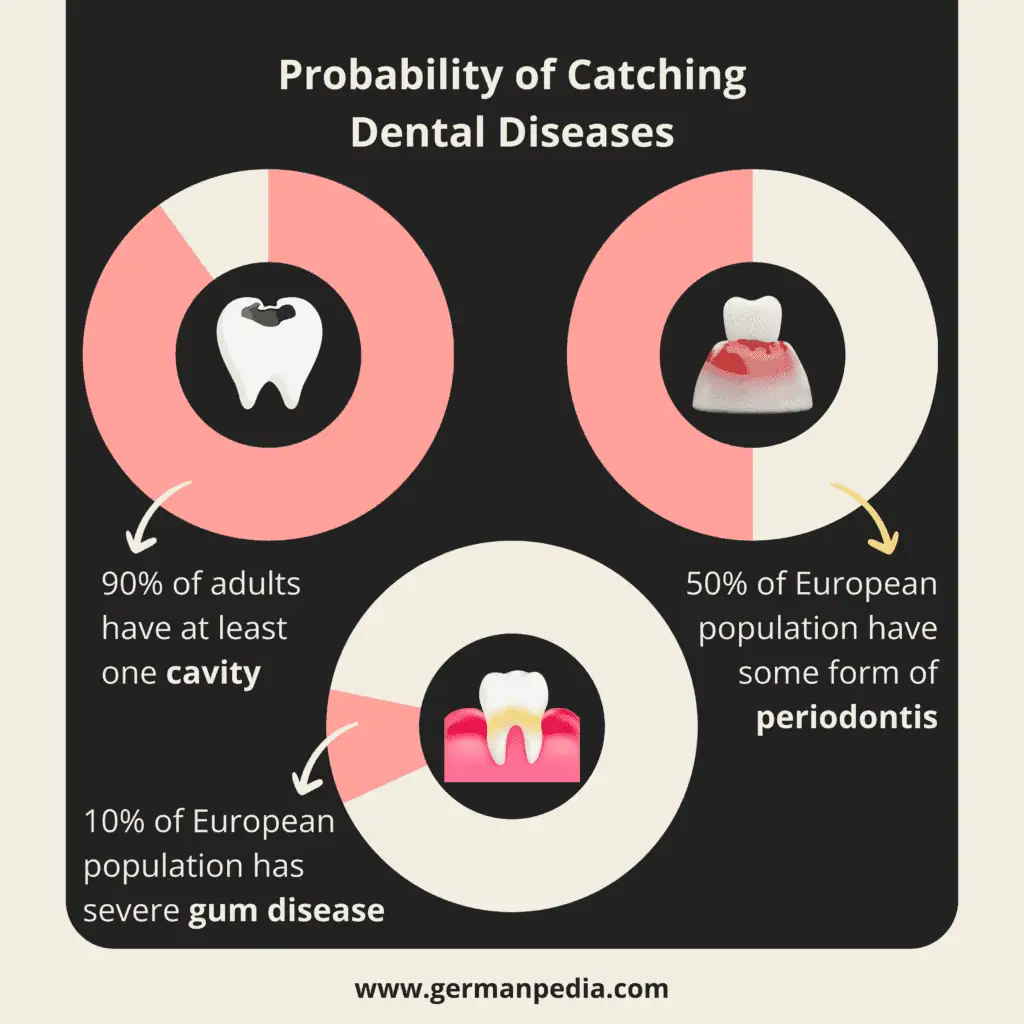
- About 90% of adults have at least one cavity. [1]
- Over 50% of the European population suffers from some form of periodontitis. The percentage increases to 70 – 85% by 60 – 65 years of age. [2]
- About 10% of the European population has severe gum disease. [2]
As you can see, catching a dental disease is inevitable. And dental treatments can cost thousands of euros.
Hence, having some form of insurance to cover dental costs makes sense.
But before we look into if you need additional dental insurance, let’s check what dental treatment costs public and private health insurance providers cover.
Dental care coverage by public health insurance in Germany
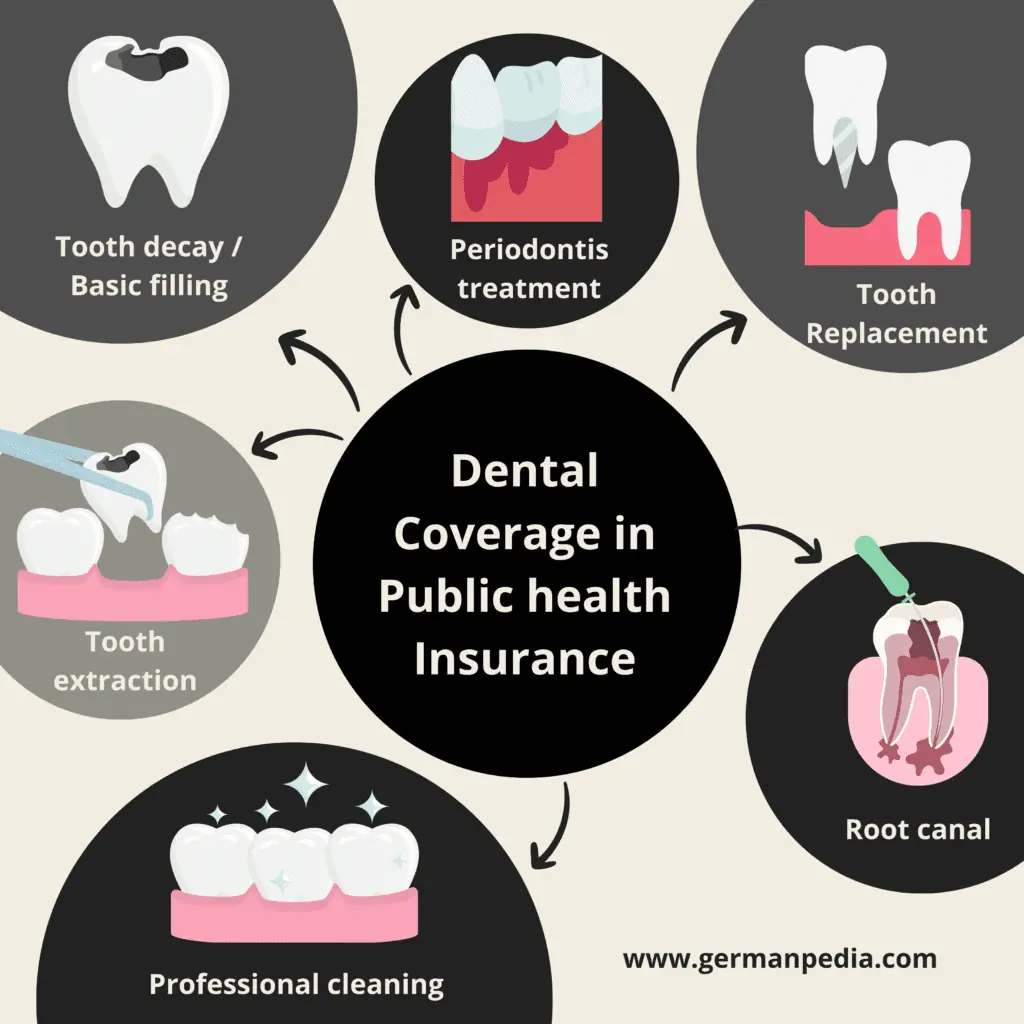
Statutory health insurance companies provide a subsidy on dental treatment costs. The subsidy is usually 60% of the dental cost. And you bear the rest.
Moreover, the subsidy is based on standard care or basic treatment costs.
What is “standard care” in Germany?
Federal Joint Committee (Gemeinsamer Bundesaussschuss) determined which dental treatments are sufficient, necessary, and economical for which diagnosis.
These necessary dental treatments come under so-called “standard care”(Regelversorgung in German).
Unfortunately, dental treatments that are part of standard care are very basic treatments. They are rarely the best treatments for your teeth from a medical point of view.
Hence, dentists often recommend more advanced dental treatment if you can afford it.
You can find a complete list of treatments under standard care on the Federal Joint Committee’s website.
For whom does public health insurance cover complete dental costs?
If you meet one of the below requirements, the statutory health insurance provider will assume the entire dental cost.
- You earn less than 1316 € gross per month.
- You are getting assistance from the government. E.g., basic security benefits in old age or in the event of reduced earning capacity or unemployment benefit II, etc.
- A social welfare agency (Sozialhilfeträger) pays your accommodation costs.
Of course, the dental costs are for treatments under standard care only.
People who satisfy the above requirements come under hardship regulations (Härtefallregelung).
Dental care coverage by private health insurance in Germany
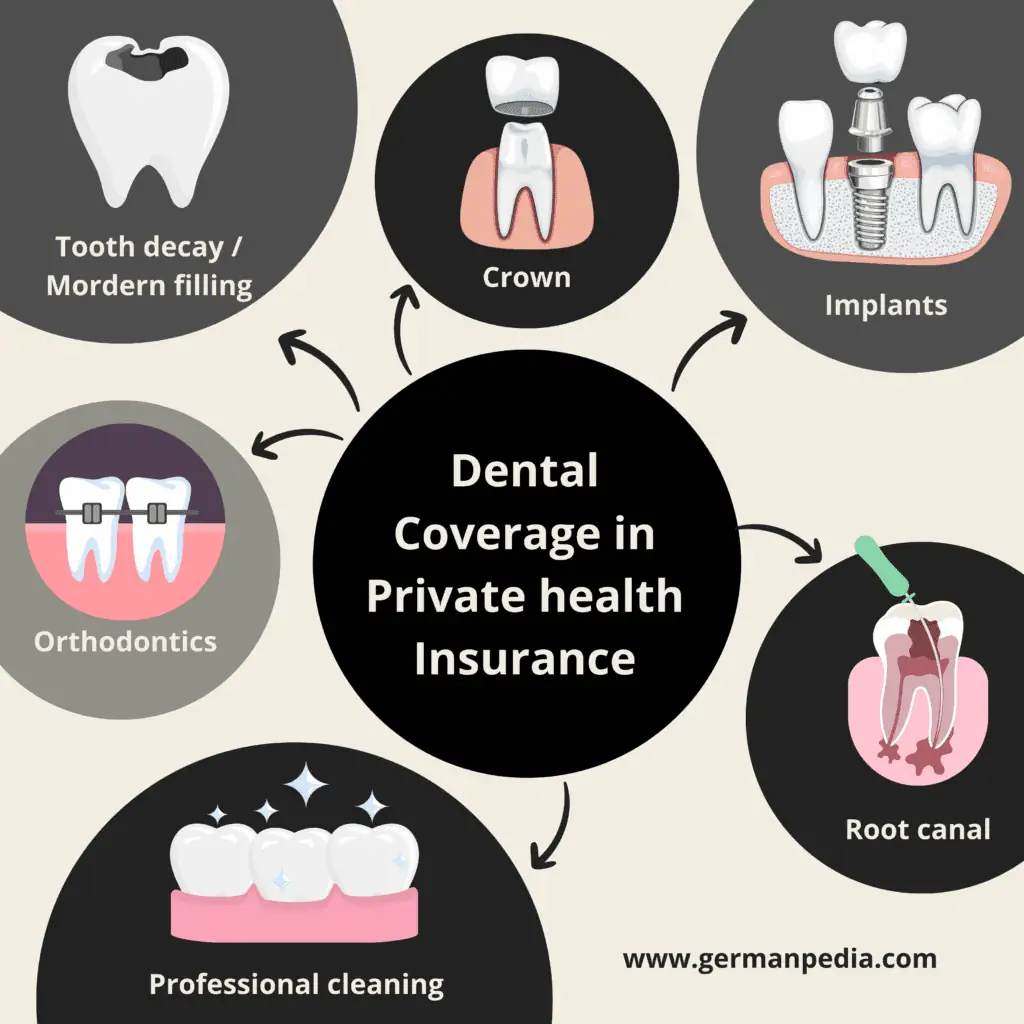
Dental coverage by private health insurance varies widely based on your tariff. Good private health insurance plans cover 90% of the dental costs.
So, you don’t need supplementary dental insurance if you have private health insurance in Germany.
You can use our “health insurance finder” tool to check which health insurance is best for you and why. We recommend consulting an insurance broker before getting private health insurance.
What should a good dental insurance policy in Germany cover?
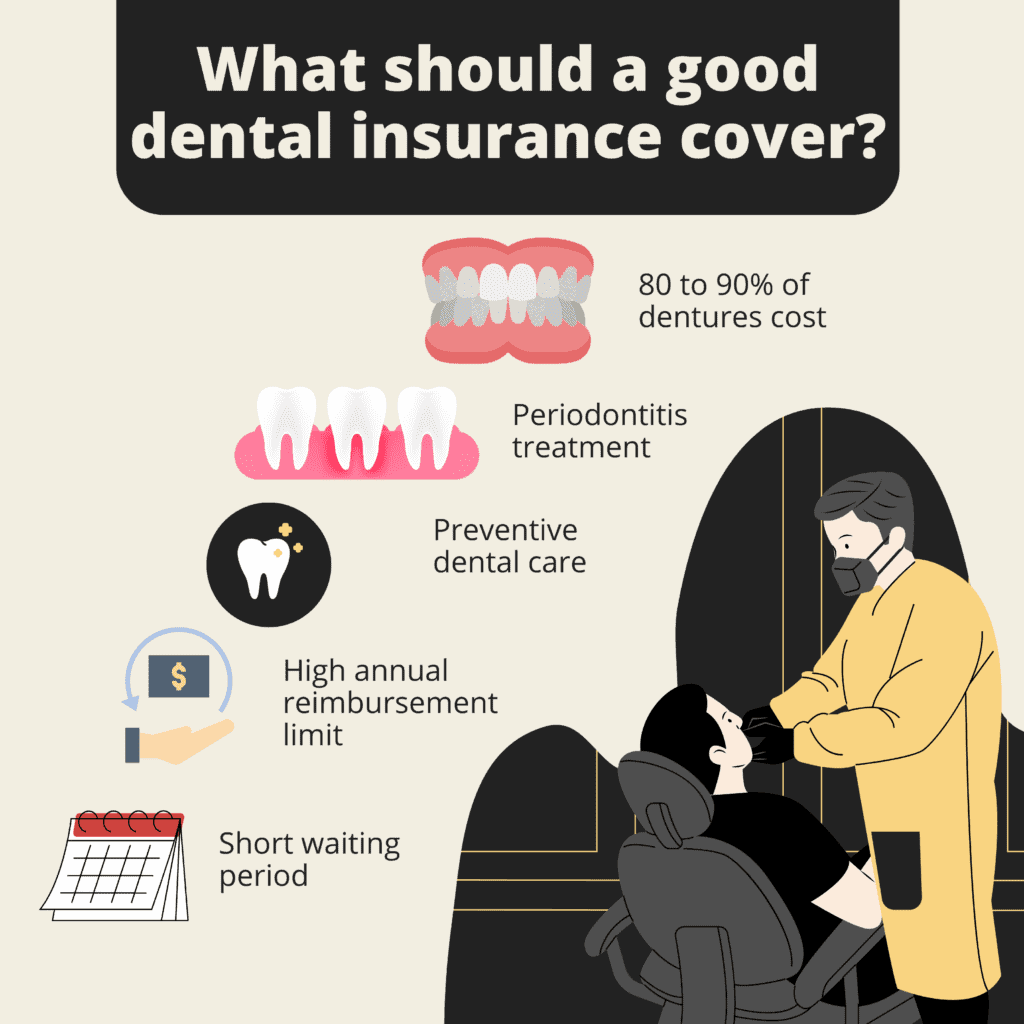
The best dental insurance plans offer the following services.
- 100% dentures (Zahnersatz) cost coverage
- 100% dental treatments (Zahnbehandlung) coverage (root canal, plastic fillings, etc.)
- Preventive dental care coverage (Professional dental cleaning)
- No waiting period
- 12 months minimum contract term
- 100% anesthesia coverage
- High reimbursement limits (at least 1250€ in the first year)
- Reimbursement up to the maximum GOZ rate
What does supplemental dental insurance not cover?
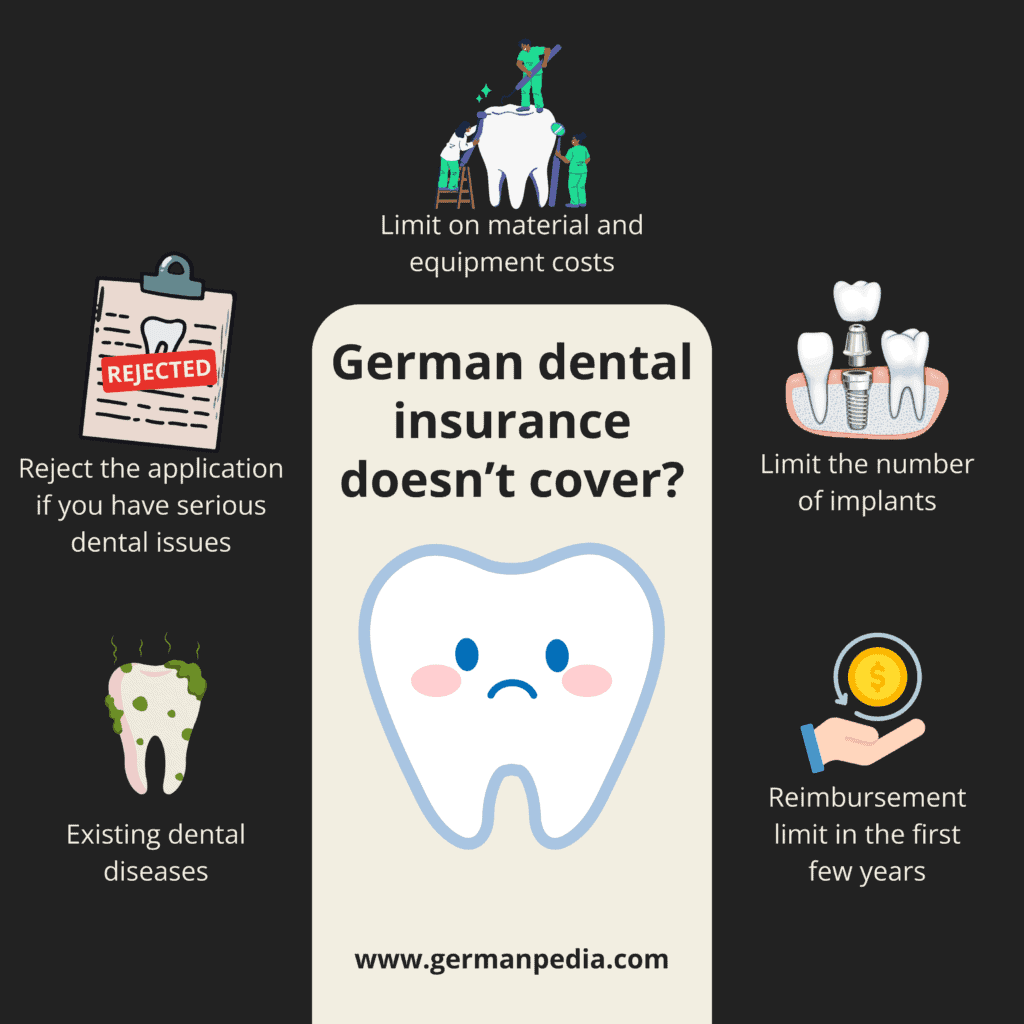
- Known dental diseases: Supplementary dental insurance providers don’t cover costs for treatments your dentist has already advised you to take or has started before you took the insurance.
- Application rejection: Many supplementary dental insurance providers reject your application if you have serious or existing dental issues. Hence, taking a good dental insurance policy is advisable as soon as you start seeing dental health issues or enter your 40s.
- Annual reimbursement limit in the first few years: Dental insurance providers put a reimbursement limit in the first 4 to 5 years of signing the contract. During this time, you pay the excess amount.
- Limit on material and equipment costs: Dental insurers often limit material and equipment costs for dental treatments. For example, your insurer refers to a list of prices and services for materials and laboratories while reimbursing the treatment costs.
- Limit on number of implants: Another limitation some dental insurance companies put in is the number of implants. For example, your dental insurer will cover 8 implants in total.
- Dental insurance contributions increase with age.
- You often pay 10 to 20% of the dental cost, even with supplementary dental insurance.
Who needs supplementary dental insurance in Germany?
There are four things one should consider before taking dental insurance in Germany.
- Age
- Health habits
- Dental treatment cost
- Dental insurance cost
Age
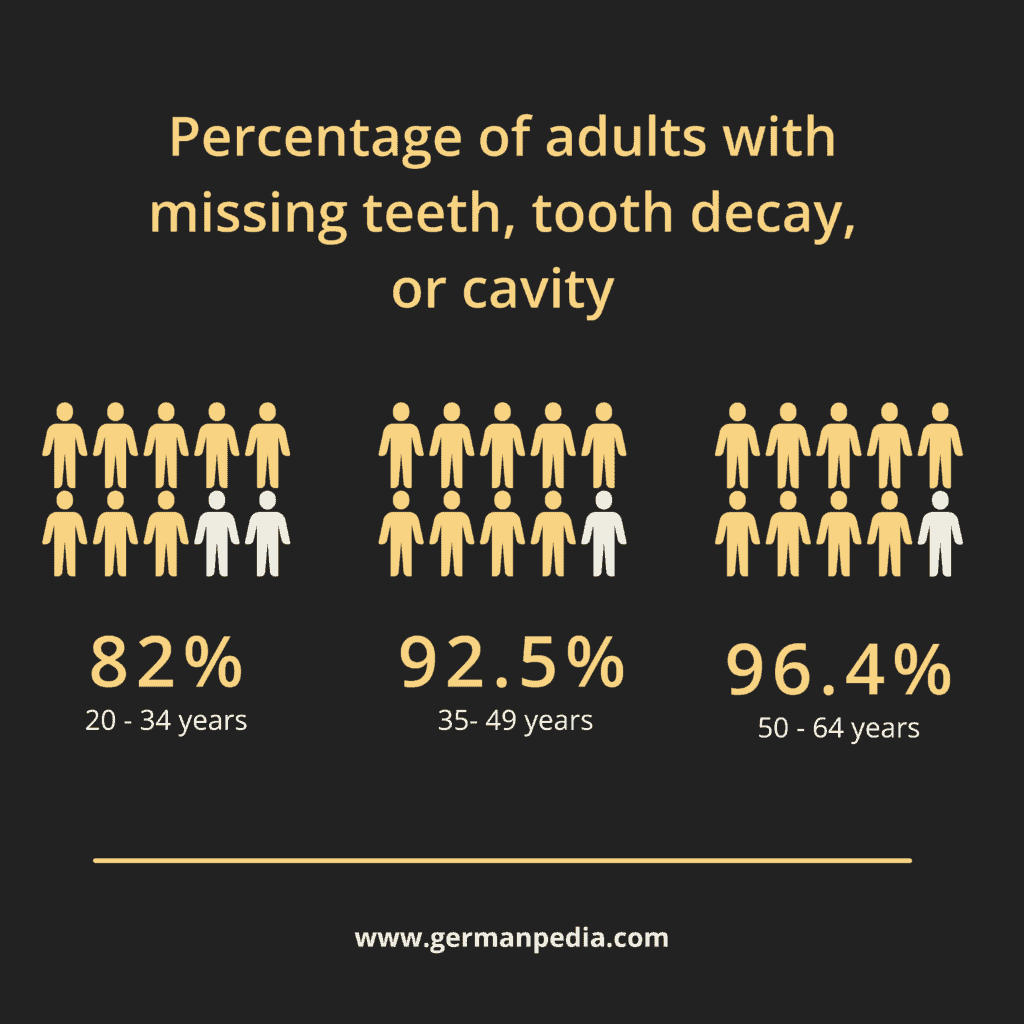
| Age | Percentage of adults with missing teeth, tooth decay, or cavities. |
|---|---|
| 20–34 years | 82% |
| 35 – 49 years | 92.5% |
| 50 – 64 years | 96.4% |
Source: NIH
Based on the data, we encourage people over 35 to consider getting a supplemental dental insurance policy.
You should also consider the reimbursement limit in the policy’s first 4 to 5 years. So, if you take dental insurance at age 35, you’ll have no limits at age 40.
Health habits
You must answer the following questions to determine when and what dental insurance you may need.
- How much time and effort do you spend on your dental care?
- How often do you visit a dentist for preventive dental care?
- Do you smoke?
- Do you have a history of dental diseases?
People who don’t visit a dentist regularly and smoke should get dental insurance sooner rather than later. We recommend that smokers over 35 get dental insurance.
On the other hand, non-smokers who maintain their dental hygiene and visit a dentist regularly can delay taking dental insurance based on their dental health.
Individuals with healthy habits and teeth should still take dental insurance as they reach 40 years of age. The reason is simple: the probability of developing a dental problem is very high once you reach 40, and there is a reimbursement limit period of 4 to 5 years.
Dental treatment cost
Dentures are the most expensive dental treatments in Germany. They may cost from 720 € to 4500 €.
Hence, taking out a good dental insurance policy is worthwhile if you need many high-priced dentures in the future.
Dental insurance cost
Last but not least, consider the cost of supplemental dental insurance. Sometimes, dental treatments are cheaper than dental insurance contributions.
Hence, observe carefully what treatments you may need before taking dental insurance.
Existing dental problems
Many dental insurers don’t accept patients with existing dental problems. Even if they accept you, insurers charge high premiums. Thus, it’s vital not to wait too long to get dental insurance.
Conclusion
We understand it’s difficult to know when to take supplemental dental insurance. But you can use the above factors to determine a good time to take one.
In general, start thinking about dental insurance once you reach 35.
Who doesn’t need supplemental dental insurance in Germany?
- People under 35 with healthy teeth and habits don’t need supplemental dental insurance in Germany. Moreover, public and private health insurers cover basic dental treatments.
- If you don’t have policies like personal liability insurance, which is more important than dental insurance, you should get those first. You can read more about which types of insurance are must-haves in Germany here.
Alternatives to dental insurance in Germany
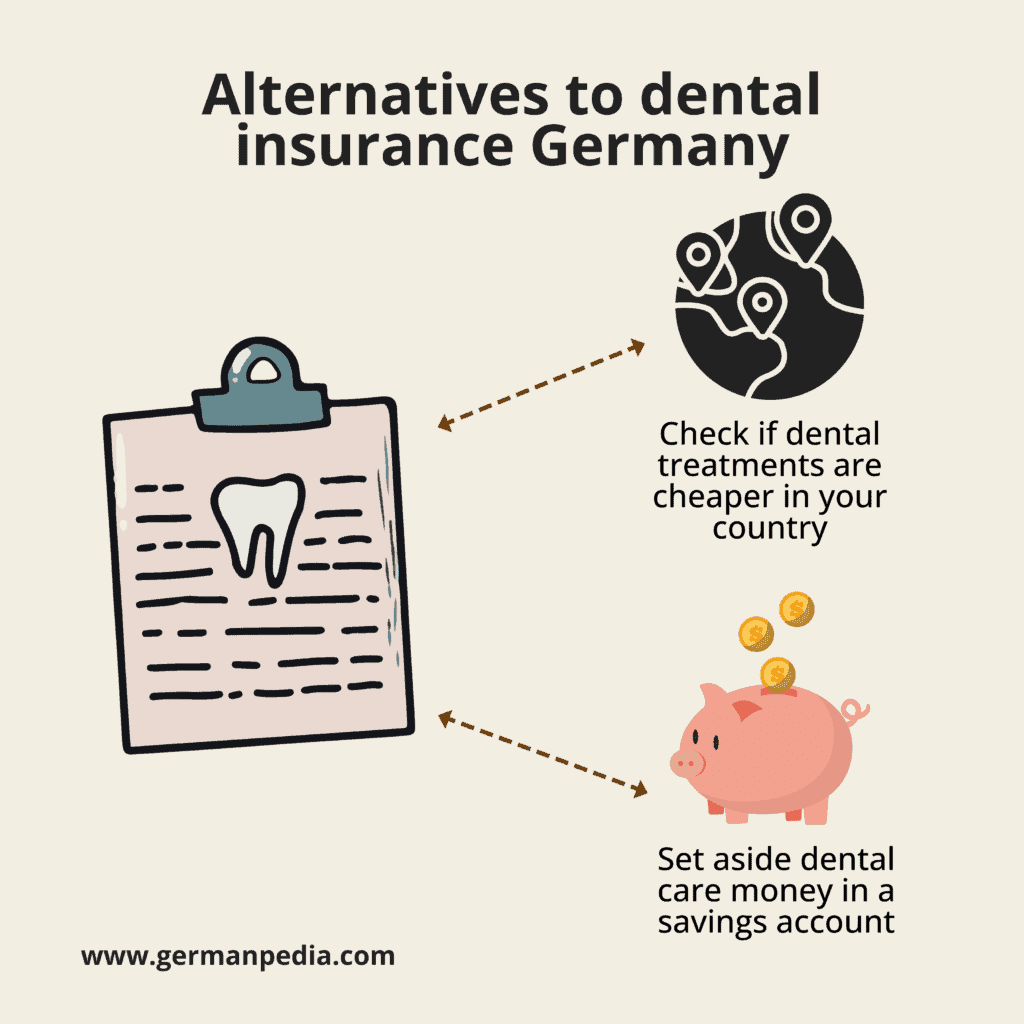
- Check if dental treatments are cheaper in your country: Many times, dental treatments in your home country might be cheaper than in Germany. For example, dental treatments in most Asian countries are cheaper than in Germany.
- Set aside dental care money in a savings account: Instead of paying an insurance premium, you can set aside some money every month for your dental care. The best way is to put the money in a savings account and earn some interest. You can open a savings account (Tagesgeld or Festgeld) and earn up to 3.5% interest annually. You can compare the savings account here*.
How to save on dental treatment costs?
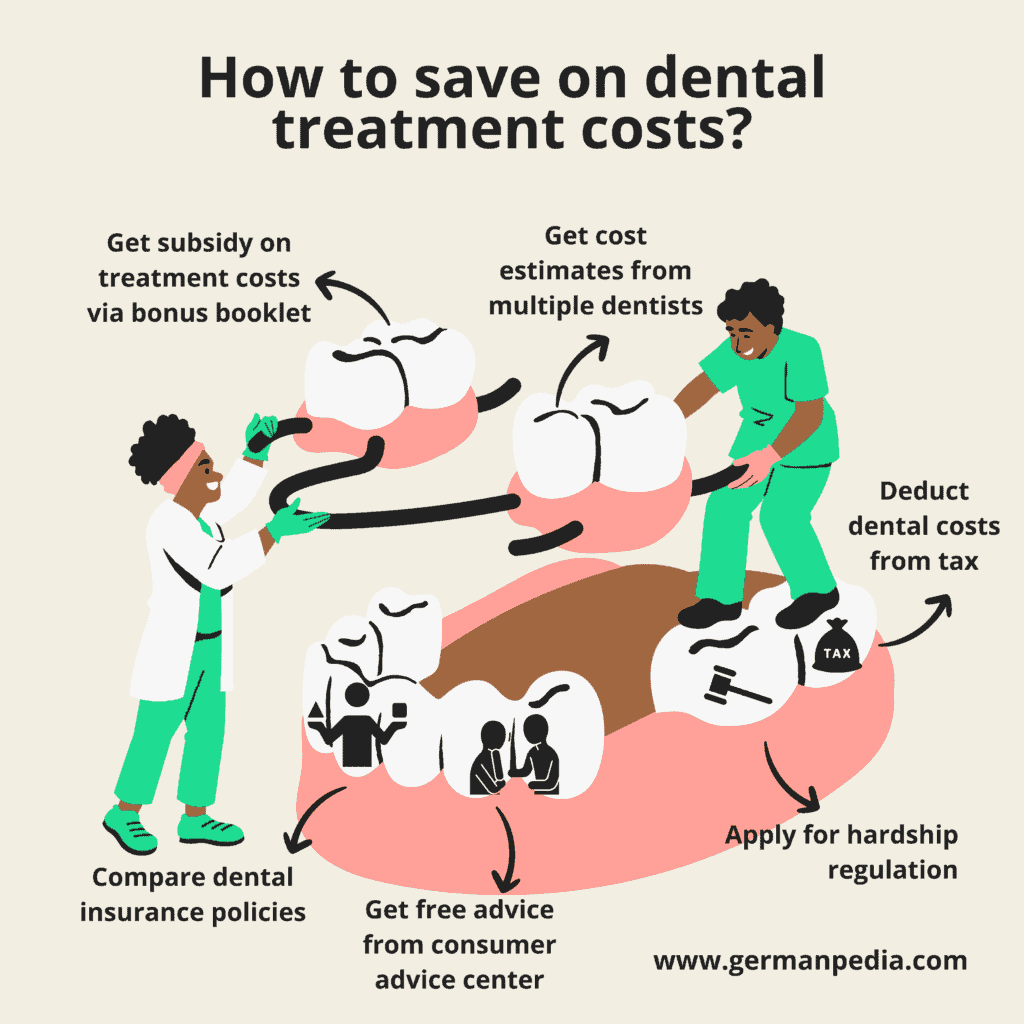
Here are six ways to save on dental treatment costs.
- Get a subsidy on treatment costs with the bonus booklet (Bonusheft)
- Apply for hardship regulation
- Get cost estimates from multiple dentists
- Compare supplementary dental insurance policies
- Deduct dental treatment costs from the tax.
You can read our guide on how to save on dental treatment costs to learn more.
FAQs on dental insurance in Germany
Do I have to pay for my dental treatments upfront in Germany?
No, dentists in Germany cannot legally demand you to pay in advance for your treatment. Only after conducting the treatment can the doctor ask for payment.
Moreover, the dentist must provide an invoice, and then you make the payment. You can forward the invoice to your supplementary dental insurance or private health insurance company for reimbursement.
NOTE: Always ask for a cost estimate from the dentist before starting the treatment. Submit the cost estimate to your dental insurer. Only when your insurer confirms the portion of the cost it’ll cover should you start the treatment.
Is it Worth to Buy Supplemental Dental Insurance In Germany?
You don’t need dental insurance if you are under 35, have healthy teeth, and maintain dental hygiene.
On the other hand, we recommend getting dental insurance sooner than later for smokers who don’t maintain dental hygiene.
Ultimately, it depends on your age, health habits, dental treatment costs, and insurance costs.
In our research, we found
- Deutsche Familienversicherung AG* (Exclusiv 100),
- Barmenia* (Mehr Zahn 100 + Mehr Zahnvorsorge Bonus),
- and Feather* (Advanced)
among the best dental insurance plans in Germany as of 2024. You can read how we found the best dental insurance plans here.
NOTE: Feather is an insurance agent and sells Barmenia’s dental insurance policies. The benefit of taking insurance from Feather is that you can file claims and get customer support in English.
Does dental insurance contribution change with age in Germany?
Yes, dental insurance contribution increases with age.
How can I find emergency dentists in Germany?
Simply dial 116117 in emergencies to find the right doctor near you. They also provide medical advice on the phone if possible.
You can also visit www.116117.de to find dental emergency services near you.
More topics
References
- https://www.verbraucherzentrale.de/wissen/gesundheit-pflege/krankenversicherung/zahnzusatzversicherung-risiken-und-vorteile-41293
- https://www.test.de/Zahnzusatzversicherung-im-Test-4730314-5728577/
- https://www.dentolo.de/ratgeber/zahnersatz-kosten/
- https://www.ottonova.de/en/v/dental-insurance-plan
- https://www.g-ba.de/richtlinien/27/
- https://www.allianz.de/gesundheit/private-krankenversicherung/zahn/
- https://www.transparent-beraten.de/private-krankenversicherung/zahnbehandlungen/
- https://www.cdc.gov/oral-health/data-research/facts-stats/fast-facts-cavities.html?CDC_AAref_Val=https://www.cdc.gov/oral-health/data-research/facts-stats/fast-facts-cavities.html
- http://www.oralhealthplatform.eu/our-work/the-state-of-oral-health-in-europe/
- https://pubmed.ncbi.nlm.nih.gov/29981185/
- https://www.tk.de/en/service-faqs/tk-benefits-doctor/professional-teeth-cleaning-2136362?tkcm=ab
- https://www.nidcr.nih.gov/research/data-statistics/dental-caries/adults
- https://www.verbraucherzentrale.de/wissen/gesundheit-pflege/aerzte-und-kliniken/igel-keine-vorkasse-bei-selbstzahlerleistungen-12353
- https://www.kzbv.de/zahlungswege.41.de.html
- https://www.kann-man-das-absetzen.de/zahnarzt/
- https://www.test.de/Zahnersatz-Kosten-4722233-5724249/
